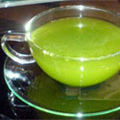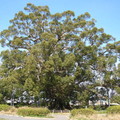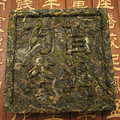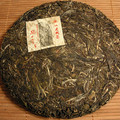Quotes - Japan
„Genmaicha (玄米茶, brown rice tea) - Bancha (sometimes Sencha) and roasted genmai (brown rice) blend. It is often mixed with a small amount of Matcha to make the color better.“

Quotes Tags: Green tea, Japan, Flavored tea
„Matcha (抹茶, powdered tea) - A fine ground tea made from Tencha. It has a very similar cultivation process as Gyokuro. It is expensive and is used primarily in the Japanese tea ceremony. Matcha is also a popular flavor of ice cream and other sweets in Japan.“

„Kukicha (くき茶, stalk tea) - A tea made from stems, stalks, and twigs. Kukicha has a mildly nutty, and slightly creamy sweet flavor.“

„Kamairicha (窯煎茶, pan-fired tea) - Kamairicha is a pan-fired green tea that does not undergo the usual steam treatments of Japanese tea and does not have the characteristic bitter taste of most Japanese tea.“

„Bancha (番茶, coarse tea) - Lower grade of Sencha harvested as a third- or fourth-flush tea between summer and autumn. Aki-Bancha (autumn Bancha) is not made from entire leaves, but from the trimmed unnecessary twigs of the tea plant.“

„Tamaryokucha (玉緑茶, lit. ball green tea) - Tamaryokucha has a tangy, berry-like taste, with a long almondy aftertaste and a deep aroma with tones of citrus, grass, and berries. It is also called Guricha.“

„Kabusecha (冠茶, covered tea) - Kabusecha is made from the leaves grown in the shade prior to harvest, although not for as long as Gyokuro. It has a more delicate flavor than Sencha. It is sometimes marketed as Gyokuro.“

„Gyokuro (玉露, Jade Dew) - Gyokuro is a fine and expensive type that differs from Sencha (煎茶) in that it is grown under the shade rather than the full sun for approximately 20 days. The name "Gyokuro" translates as "jade dew" and refers to the pale green color of the infusion. The shading causes the amino acids (Theanine) and caffeine in the tea leaves to increase, while catechins (the source of bitterness in tea, along with caffeine) decreases, giving rise to a sweet taste. The tea also has a distinct aroma.“

„Sencha (煎茶, decocted tea) - The first and second flush of green tea made from leaves that are exposed directly to sunlight. This is the most common green tea in Japan. The name describes the method for preparing the beverage.“

„Green tea (緑茶 Ryokucha) is ubiquitous in Japan and therefore is more commonly known simply as "tea" (お茶 ocha).“

Teas
2013 "Light Roast" Wild Tree Purple Varietal
 1 review
1 reviewThis is a lightly processed black tea that was hand-crafted using a wild tree purple leaf varietal from...
HeKai 2013 - blind tasting set 2
 1 review
1 reviewnicely balanced bitterness with a breze of sweetness, beautiful honey-fruity aroma, pleasant and pure...
2011 Yunnan Mao Feng (early March)
 1 review
1 reviewThe Yunnan Mao Feng is one of most popular green teas from Simao
Theme
Tea by region
We will help you with tea selection.
Do you like quality loose tea?
We will help you to find the right one for you. Be inspired by tea ratings of other tea lovers. Rating stars could help you.


Review your cup of tea.
Review the tea you are drinking and help other tea lovers to find the right cup of tea.



Quotes
„Depending on the desired product and speed, from quickest and tightest to slowest and loosest, pressing can be done by a large heavy stone, carved into the shape of a short cylinder with a handle, simply weighs a bag of tea down onto a wooden board. The tension from the bag and the weight of the stone together give the tea its rounded and sometimes non-uniformed edge. Due to the manual labor involved, this method of pressing is often referred to as: "hand" or "stone-pressing", and is how many artisanal pu'er bǐng are still manufactured.“



 Shops
Shops Share on Facebook
Share on Facebook









